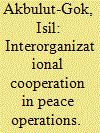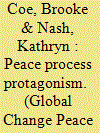|
|
|
Sort Order |
|
|
|
Items / Page
|
|
|
|
|
|
|
| Srl | Item |
| 1 |
ID:
172159


|
|
|
|
|
| Summary/Abstract |
This article argues that China’s Belt and Road Initiative (BRI) can be understood via the lens of regional ordering, whereby China attempts to redefine the shared goals and values for the region of Eurasia and to socialise regional states into the new values in order to have their consent to its leadership. The success of this strategy would then depend, to a large extent, on how its target regional audience reacts to the order-remaking strategy and practices. Taking an ‘eye of the beholder’ perspective, this article focuses on Indian perceptions of China’s order-remaking strategy in South Asia. It posits that India uses the ‘debt trap diplomacy’ narrative to delegitimise China’s infrastructure investment activities based on state capitalism, which have been perceived as a move to upend the status quo and challenge New Delhi’s traditional leadership in the region. To counter China’s growing influence, India is networking with other like-minded countries to promote a ‘free and open Indo-Pacific’ through groupings such as the Asia-Africa Growth Corridor, the Quad, Malabar exercises, and increasing political and economic bonds with the ASEAN countries. A serious contest over order between China and India in the Indian Ocean is looming on the horizon.
|
|
|
|
|
|
|
|
|
|
|
|
|
|
|
|
| 2 |
ID:
172158


|
|
|
|
|
| Summary/Abstract |
State collapse is a highly consequential event. But we know very little about the reasons why and how states lose their capacities of violence control, rule-making and taxation. In order to explore the underlying causal mechanisms, we use a nested analysis combining Qualitative Comparative Analysis and comparative process-tracing. While the mobilisation of armed opposition groups is a necessary condition for state collapse, it only works in concurrence with other conditions, namely political transitions, repression, factionalism, intra-elite rivalry and external interventions. Thus, the article presents a causal model that shows the alternative pathways leading to state collapse.
|
|
|
|
|
|
|
|
|
|
|
|
|
|
|
|
| 3 |
ID:
172155


|
|
|
|
|
| Summary/Abstract |
This study proposes a network approach to interorganizational cooperation in peace operations. It suggests that in addition to key organisational characteristics that are already established in the literature, such as organisational type, the nature of relationships among intergovernmental organisations (IGOs) drives the formation and evolution of inter-IGO networks in peace operations. To evaluate my hypotheses, I use the temporal exponential random graph model (TERGM). The empirical analysis provides evidence that the formation of interorganizational networks among IGOs in peace operations is largely driven by relational effects, e.g. network effects.
|
|
|
|
|
|
|
|
|
|
|
|
|
|
|
|
| 4 |
ID:
172157


|
|
|
|
|
| Summary/Abstract |
Regional and sub-regional organisations in Africa play vital roles in the promotion of peace and security on the continent. The African Peace and Security Architecture (APSA) mandates certain roles for AU-recognised Regional Economic Communities (RECs), and RECs have been active in many peace and security spheres from early warning to peace missions. This article seeks to illuminate the changing landscape of regional security governance in Africa, primarily through the lens of formal peace agreements, which are important tools for ending violent conflict. Extant research does not establish the frequency and capacity of regional organisations’ engagement in peace agreements. We present original quantitative data, systematically tracing these evolving and uneven activities. Our data establishes trends of REC peace agreement engagement that vary across Africa's sub-regions during 2002–2015. We further explore patterns of organisational interaction, presenting case studies of peace processes that highlight important variation in terms of the distribution of influence and authority.
|
|
|
|
|
|
|
|
|
|
|
|
|
|
|
|
| 5 |
ID:
172160


|
|
|
|
|
| Summary/Abstract |
In recent years, the number of suicidal terror attacks in advanced societies has decreased, inducing the public to widely remove the issue from public post-modern debate. Yet as, among many other examples, the attacks on a church in Sri Lanka’s capital Colombo in April 2019 with more than 250 dead and 500 wounded have shown, the age of suicide terrorism is far from over. On the contrary, the archetype remains one of the most present influences in the unconscious imaginary of globalisation, including that of open societies. We shouldn’t forget that we still have a lot of work to do in order to better understand and solve the problem, writes Roland Benedikter.
|
|
|
|
|
|
|
|
|
|
|
|
|
|
|
|
| 6 |
ID:
172156


|
|
|
|
|
| Summary/Abstract |
This study analyses a large number of regime-change seeking movements, their experiences with state repression, and the outcome of security force defection. Crisp-set Qualitative-Comparative Analysis (csQCA) is utilised to investigate six conditions and set-theoretic associations with defection. Results reveal that defection is neither sufficiently nor necessarily tied to any single condition. Contrary to theoretical expectations, of the most salient identified solutions, three out of five feature the presence of a violent oppositional campaign. There exist heterogeneous pathways that can lead to defection and defection has occurred in cases of both violent and nonviolent resistance. While mass nonviolent dissent can spur defection by fostering regime fragility, by providing protesters favourable opportunities to overcome state repression or through persuading security forces to not repress, large violent movements (100,000 or more participants) can also cause defections by directly challenging regime security support pillars. This analysis offers timely implications for our understanding of the interrelated character of dissent, repression and security force defection.
|
|
|
|
|
|
|
|
|
|
|
|
|
|
|
|
|
|
|
|
|